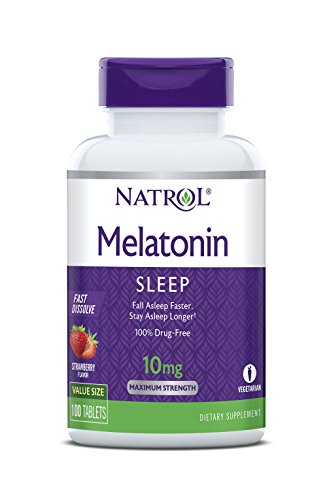Here are the top selling Melatonin items - by Sales Rank
| Image | Product | Sales Rank |
 |
#79
in Health & Household
|
|
 |
#285
in Health & Household
|
|
 |
|
#1035
in Health & Household
|
 |
#938
in Health & Household
|
|
 |
|
#532
in Health & Household
|
Here are some popular sub-lingual, fast dissolving Melatonin supplements:
-----
-----
|
Melatonin Supplements: Did
You Know This Over The Counter Sleep
Aid Is Often Overdosed?
"The
optimal dose of Melatonin may be a
little bit surprising, especially
considering the example above. In
various studies, it was found that
the correct dose for Melatonin is
actually very low, clocking in at a
mere 300mcg (or 0.3mg). This dose
appears to elevate Melatonin to
significant levels in the brain
while minimizing the incidence of
potential Melatonin side effects. In
fact, there wasn’t much benefit to
taking more than 300mcg, and from
the looks of it, taking more only
appears to promote potential
Melatonin side effects. So if this
is the case then why is it so common
to see supplements with a Melatonin
dosage upwards of 10mg?
There are a few reasons for this, the first of which being a patent on the use of Melatonin. Much of the initial research on Melatonin was done at MIT, and these scientists realizing the potential of an effective Melatonin supplement, sought to patent Melatonin in order to ensure exclusive use of Melatonin. However, since patenting a naturally occurring compound can be a little bit tricky, they only got a patent for the use of Melatonin from 300mcg up to 1mg. They specifically picked that dosage range because it was the ideal amount and they figured that would cover them on the patent side. This was done partially with regulation in mind, but what ended up happening was quite the opposite."
|
http://news.mit.edu/2005/melatonin "In earlier research, scientists led by Professor Richard Wurtman, principal investigator for the current study, showed that only a small dose of melatonin (about 0.3 milligrams) is necessary for a restful effect. Taken in that quantity, it not only helps people fall asleep, but also makes it easier for them to return to sleep after waking up during the night--a problem for many older adults.
The researchers also found, however, that commercially available melatonin pills contain 10 times the effective amount. And at that dose, "after a few days it stops working," said Wurtman, director of MIT's Clinical Research Center and the Cecil H. Green Distinguished Professor. When the melatonin receptors in the brain are exposed to too much of the hormone, they become unresponsive."https://patents.google.com/patent/US5449683?oq=melatonin+mit
https://www.hopkinsmedicine.org/health/wellness-and-prevention/melatonin-for-sleep-does-it-work
https://www.ncbi.nlm.nih.gov/pubmed/12076414# - 2002 . Melatonin for the prevention and treatment of jet lag.













